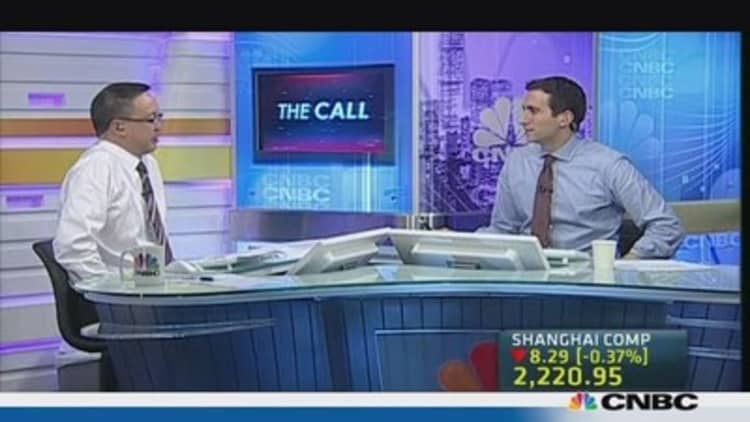Bold, shiny and blue, the newly expanded European headquarters of Hyundai Motor opened for business in early October, the latest beacon of the South Korean company's undimmed ambitions in a car market bereft of light.
The Hyundai building is to be found in Offenbach, a short drive from the German city of Frankfurt, which hosts the European headquarters of Kia Motors, Hyundai's 34 percent-owned subsidiary. Not far away are Hyundai's design center at Rüsselsheim and its new test center at the Nürburgring, opened in September.
Outside Germany, Hyundai operates two car plants, one in the Czech Republic and one in Turkey, with a combined annual production capacity of 500,000 units. For its part, Kia has a plant in Slovakia with a capacity of 300,000. Make no mistake, the South Koreans are in Europe to stay. Conspicuously, they hire European employees to design, manufacture, test and sell their cars, mainly to other Europeans.
(Read more: South Korean stocks enjoy longest buying spree)

For governments anxious about bulging unemployment rates and current account deficits, such large-scale foreign investment is normally a cause for celebration. In the case of cars, however, European politicians and trade unionists find it hard to applaud in unison. All know that Europe's car industry suffers from chronic overcapacity. But some in one region of Europe suspect that, if an overseas manufacturer in another region is churning out cars by the hundreds of thousands, it can only do so at the expense of their own country's carmakers.
The fiercest criticisms of Hyundai and Kia usually come from France, where one week ago PSA Peugeot Citroën produced a car for the last time at Aulnay-sous-Bois, a 40-year-old factory outside Paris. Arnaud Montebourg, industry minister in France's socialist government, had no sooner assumed office last year than he accused the South Korean carmakers of dumping. Later on, he suggested that any French drivers buying Hyundais or Kias would be engaging in "social cruelty" because the companies' workers in South Korea were treated almost like slave ants.
(Read more: Hyundai Motor goes conservative with redesigned Sonata, Genesis)
Quite correctly, EU antitrust regulators view these complaints as rather missing the point. Among the reasons for the success in Europe of Hyundai and Kia are, for sure, the less expensive production costs and labour flexibility that come from setting up plants in the Czech Republic and Turkey rather than France or Italy. But there is more to it than that.
The South Koreans offer persuasive evidence that if you make reliable, reasonably stylish cars, such as Hyundai's i30, that do not overstretch a family budget, you will not merely survive hard times, you may even expand your market share. The resources and expertise that Hyundai and Kia put into their design effort help explain why, between the onset of the 2008 financial crisis and the start of this year, the two companies doubled their combined market share in Europe to more than 6 per cent – Hyundai 3.5 percent, Kia 2.7 percent.
(Read more: Hottestbattle among automakers: Luxury under $50K)

Another important factor is that they provide exceptional after-sale guarantees for buyers of new cars: Hyundai gives its customers a five-year warranty with no mileage limit, Kia a seven-year warranty. These have eased whatever concerns customers once had about the quality of the vehicles.
More from the Financial Times:
South Korea warmsto idea of joining TPP trade group
Doubts cloud strong South Korea growth
South Korea pays heavy price for education
True, the South Korean acceleration has slowed this year. Hyundai once set a target of 2015 to achieve a 5 percent market share for itself, but it now regards 2020 as more realistic. Hyundai is still a long way from challenging Volkswagen as Europe's premier mass-market carmaker.
On the other hand, Hyundai is well-positioned to keep pushing forward. By the end of 2014 Fiat, Ford, PSA Peugeot Citroën and Opel, the European subsidiary of General Motors, will all have closed at least one car plant in Europe during the financial crisis and recession of the past six years. Yet production overcapacity remains an albatross around the neck of most of Europe's mass-market car manufacturers.
(Watch now: Automakers relyon North America)
Since their 2007 peak, new vehicle registrations have collapsed in Europe by 25 percent, or 4.4 million units. Even the modest recovery that is in sight will not quickly, or perhaps ever, return sales of new cars to their previous heights. The price discounts on mass-market cars to which consumers have become accustomed will continue to weigh on profits.
For Hyundai, the next test will be in the premium brand market segment that reaps higher margins. It has high hopes for its Genesis sedan, which will make its European debut next year. Europe's traditional carmakers cannot say they have not been warned.

